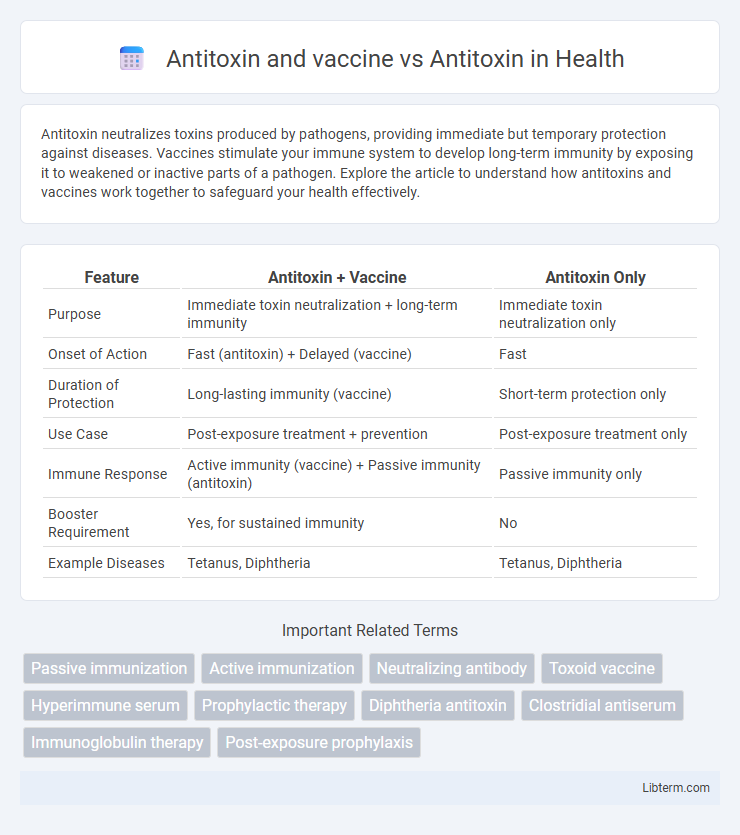Antitoxin neutralizes toxins produced by pathogens, providing immediate but temporary protection against diseases. Vaccines stimulate your immune system to develop long-term immunity by exposing it to weakened or inactive parts of a pathogen. Explore the article to understand how antitoxins and vaccines work together to safeguard your health effectively.
Table of Comparison
| Feature | Antitoxin + Vaccine | Antitoxin Only |
|---|---|---|
| Purpose | Immediate toxin neutralization + long-term immunity | Immediate toxin neutralization only |
| Onset of Action | Fast (antitoxin) + Delayed (vaccine) | Fast |
| Duration of Protection | Long-lasting immunity (vaccine) | Short-term protection only |
| Use Case | Post-exposure treatment + prevention | Post-exposure treatment only |
| Immune Response | Active immunity (vaccine) + Passive immunity (antitoxin) | Passive immunity only |
| Booster Requirement | Yes, for sustained immunity | No |
| Example Diseases | Tetanus, Diphtheria | Tetanus, Diphtheria |
Introduction to Antitoxins and Vaccines
Antitoxins are immune substances derived from antibodies that neutralize specific toxins produced by pathogens, providing immediate passive immunity. Vaccines stimulate the body's active immune response by exposing it to a weakened or inactivated form of the pathogen or its toxin, leading to long-lasting protection. Unlike antitoxins that offer temporary defense, vaccines enable the immune system to develop memory cells for sustained immunity.
Mechanism of Action: Antitoxins Explained
Antitoxins neutralize specific toxins by binding directly to them, preventing their interaction with host cells and mitigating toxic effects rapidly. Vaccines stimulate the immune system to produce antibodies by exposing the body to an antigen, leading to long-term immunity against future toxin exposure. While antitoxins provide immediate passive immunity by supplying antibodies, vaccines enable active immunity through the body's own antibody production.
How Vaccines Work Against Toxins
Vaccines work against toxins by stimulating the immune system to produce specific antibodies that neutralize the harmful effects of bacterial toxins before they can cause damage. Unlike antitoxins, which provide immediate but temporary passive immunity through direct toxin neutralization, vaccines induce long-lasting active immunity by training the body to recognize and combat the toxin. This immune memory enhances protection against future toxin exposure, reducing the risk of illness caused by toxin-producing bacteria.
Key Differences: Antitoxin vs Vaccine
Antitoxins provide immediate passive immunity by neutralizing toxins already present in the body, whereas vaccines stimulate the immune system to develop active immunity by producing antibodies against specific pathogens. Antitoxins are typically derived from animal or human serum containing antibodies and are used for rapid treatment of toxin-related diseases like tetanus or diphtheria. Vaccines offer long-term protection by training the immune system to recognize and combat future infections without immediate toxin neutralization.
Clinical Uses of Antitoxins
Antitoxins are primarily used in clinical settings to neutralize specific toxins produced by bacteria, providing immediate passive immunity against diseases such as diphtheria, tetanus, and botulism. Unlike vaccines, which stimulate the body's immune system to produce active immunity over time, antitoxins deliver preformed antibodies for rapid toxin neutralization in acute cases. Their clinical application is critical in emergency treatment scenarios where swift toxin neutralization can prevent severe complications or death.
Therapeutic Applications of Vaccines
Vaccines stimulate the immune system to produce targeted antibodies, providing long-term protection against infectious diseases, while antitoxins offer immediate, passive immunity by neutralizing specific toxins after exposure. Therapeutic applications of vaccines extend beyond prevention, including cancer immunotherapy and treatment of chronic infections by enhancing the body's adaptive immune response. This active immunization approach leverages antigen-specific memory for sustained therapeutic effects, contrasting with the transient protection conferred by antitoxins.
Advantages and Limitations of Antitoxins
Antitoxins provide immediate neutralization of toxins by supplying passive immunity through preformed antibodies, offering rapid protection in toxin-mediated diseases such as diphtheria and tetanus. Their advantages include quick onset of action and effectiveness even after toxin exposure, but limitations arise from their temporary effect, potential allergic reactions, and lack of long-term immunity. In contrast, vaccines induce active immunity by stimulating the body to produce its own antibodies, providing prolonged protection but requiring more time to generate an immune response.
Benefits and Drawbacks of Vaccines
Vaccines stimulate the immune system to produce long-lasting protection against specific pathogens by promoting antibody and memory cell formation, reducing disease incidence and severity. Their benefits include prevention of infection and herd immunity, but drawbacks involve potential side effects, variable effectiveness across populations, and the need for periodic boosters. In contrast, antitoxins provide immediate, short-term neutralization of toxins without inducing immunity, making vaccines preferable for long-term disease control.
Antitoxin and Vaccine Synergy in Disease Control
Antitoxin and vaccine synergy enhances disease control by combining immediate toxin neutralization with long-term immunity development. Antitoxins provide passive immunity by neutralizing circulating toxins, while vaccines stimulate active immunity by promoting antibody production against pathogens. This dual approach optimizes patient outcomes, reduces disease severity, and limits transmission in populations.
Future Perspectives in Toxin Prevention and Treatment
Future perspectives in toxin prevention and treatment highlight advancements in vaccine development that provide long-lasting immunity against specific toxins, surpassing the temporary neutralization offered by antitoxins. Innovations in vaccine technology, such as recombinant and mRNA platforms, promise enhanced efficacy and safety in combating toxin-mediated diseases. Ongoing research aims to integrate vaccines with antitoxin therapies to create comprehensive strategies for both immediate toxin neutralization and sustained immune protection.
Antitoxin and vaccine Infographic

 libterm.com
libterm.com